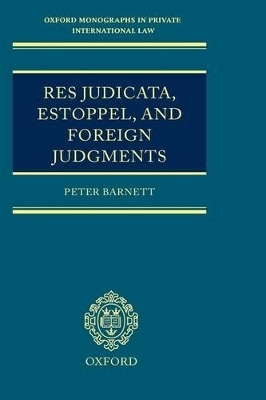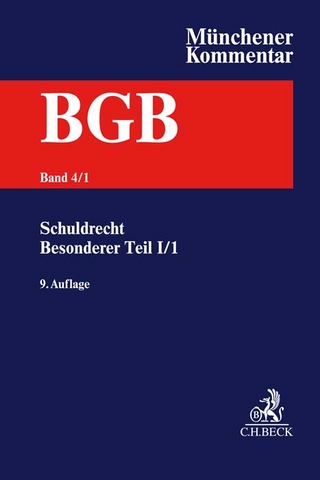
Res Judicata, Estoppel and Foreign Judgments
The Preclusive Effects of Foreign Judgments in Private International Law
Seiten
2001
Oxford University Press (Verlag)
978-0-19-924339-6 (ISBN)
Oxford University Press (Verlag)
978-0-19-924339-6 (ISBN)
This book re-examines the doctrines of res judicata and abuse of process when applied to foreign judgments, and analyses how they are relied upon in English proceedings. The book explains the four main pleas to which a foreign res judicata might give rise in subsequent proceedings in England.
This clear and original book provides a much-needed analysis of the doctrines of res judicata and abuse of process as applied to foreign judgments recognized in England for their preclusive effect. In particular, it examines the four preclusive pleas which are encountered in practice, namely: (i) cause of action estoppel; (ii) issue estoppel; (iii) former recovery per section 34 of the Civil Jurisdiction and Judgments Act 1982; and (iv) the rule in Henderson v Henderson. So far as foreign judgments are concerned, the book examines separately the preclusive effects of foreign judgments recognized according to the English common law and related statutory rules, and foreign judgments which the English courts are obliged to recognize under the Brussels and Lugano Conventions. It also includes a discussion of the preclusive effects of judgments recognized under the proposed Hague Convention on Jurisdiction and Foreign Judgments in civil and commercial matters.
Although the complex and technical doctrines of res judicata and abuse of process are well known in the context of domestic judicial decisions, little has hitherto been written analysing how these doctrines apply when the judgment emanates from a foreign court. It is not surprising, therefore, that this area of law has been frequently confused and mis-applied. And yet the recognition of foreign judgments for preclusive purposes is an increasingly important area for practitioners and academics - especially for those interested in international commercial litigation, and not least given the important treaty developments that are occurring. For these reasons, this book is a very timely work. Written with a practitioner focus, it includes extensive references to res judicata authorities in the United Kingdom, Australia and Canada.
This clear and original book provides a much-needed analysis of the doctrines of res judicata and abuse of process as applied to foreign judgments recognized in England for their preclusive effect. In particular, it examines the four preclusive pleas which are encountered in practice, namely: (i) cause of action estoppel; (ii) issue estoppel; (iii) former recovery per section 34 of the Civil Jurisdiction and Judgments Act 1982; and (iv) the rule in Henderson v Henderson. So far as foreign judgments are concerned, the book examines separately the preclusive effects of foreign judgments recognized according to the English common law and related statutory rules, and foreign judgments which the English courts are obliged to recognize under the Brussels and Lugano Conventions. It also includes a discussion of the preclusive effects of judgments recognized under the proposed Hague Convention on Jurisdiction and Foreign Judgments in civil and commercial matters.
Although the complex and technical doctrines of res judicata and abuse of process are well known in the context of domestic judicial decisions, little has hitherto been written analysing how these doctrines apply when the judgment emanates from a foreign court. It is not surprising, therefore, that this area of law has been frequently confused and mis-applied. And yet the recognition of foreign judgments for preclusive purposes is an increasingly important area for practitioners and academics - especially for those interested in international commercial litigation, and not least given the important treaty developments that are occurring. For these reasons, this book is a very timely work. Written with a practitioner focus, it includes extensive references to res judicata authorities in the United Kingdom, Australia and Canada.
Peter Barnett holds a D Phil from the University of Oxford and is a Legal Practitioner of the Supreme Court of New South Wales. He is soon to be admitted as a Legal Practitioner of the High Court of Australia and Solicitor of the High Court of England and Wales.
I: INTRODUCTION ; II: THE PRECLUSIVE EFFECTS OF FOREIGN JUDGMENTS RECOGNISED IN ENGLAND AT COMMON LAW OR UNDER RELATED STATUTORY SCHEMES ; III: THE PRECLUSIVE EFFECTS OF FOREIGN JUDGMENTS RECOGNISED IN ENGLAND UNDER INTERNATIONAL CONVENTIONS ; IV: CONCLUSION
| Erscheint lt. Verlag | 15.3.2001 |
|---|---|
| Reihe/Serie | Oxford Private International Law Series |
| Verlagsort | Oxford |
| Sprache | englisch |
| Maße | 164 x 235 mm |
| Gewicht | 726 g |
| Themenwelt | Recht / Steuern ► Allgemeines / Lexika |
| Recht / Steuern ► EU / Internationales Recht | |
| Recht / Steuern ► Privatrecht / Bürgerliches Recht ► Internationales Privatrecht | |
| Recht / Steuern ► Privatrecht / Bürgerliches Recht ► Zivilverfahrensrecht | |
| ISBN-10 | 0-19-924339-5 / 0199243395 |
| ISBN-13 | 978-0-19-924339-6 / 9780199243396 |
| Zustand | Neuware |
| Haben Sie eine Frage zum Produkt? |
Mehr entdecken
aus dem Bereich
aus dem Bereich
1. Halbband: §§ 433-480, CISG
Buch | Hardcover (2024)
C.H.Beck (Verlag)
CHF 166,60


